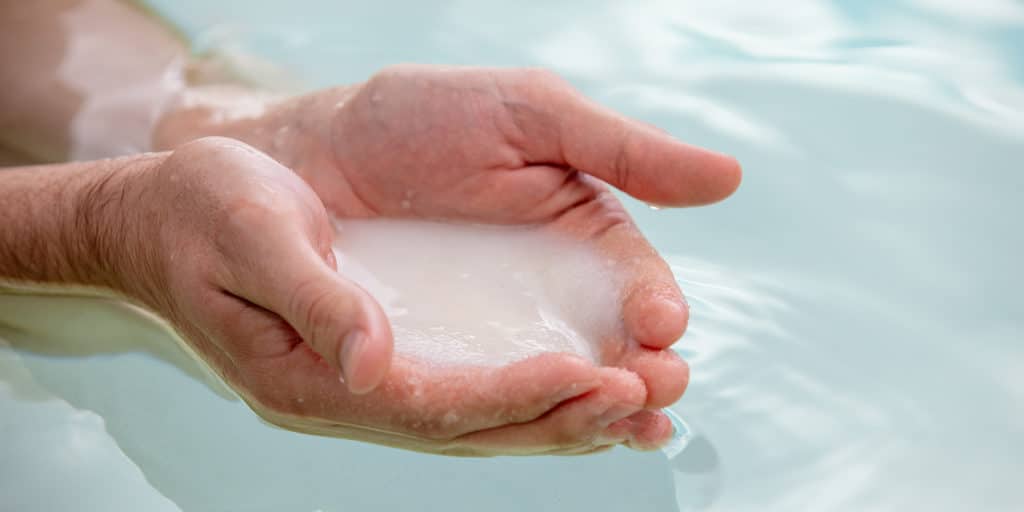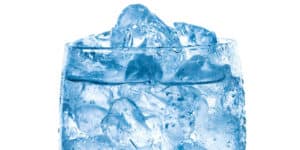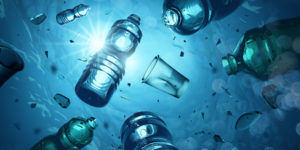
When you have a glass of salty-tasting water it’s automatic to assume that it just has a little bit of common salt (NaCl – Sodium Chloride). However, it’s not a sure thing that the salt we all know and love is what is causing the taste. What is true is that your drinking water is being affected by something and the responsible thing to do is ensure that it’s not harmful.
Chloride, sulfates, or sodium are most often the culprits of a salty taste in your water. While none of these are particularly dangerous to drink on their own, in large quantities they can be harmful or indicative of other hazardous pollutants. Therefore, it’s essential to find out what is causing your water to have a different taste so that you can either fix the issue or have peace of mind that the salty taste is not a health risk.
Note: While an unpleasant salty taste is something that you should always have assessed for health reasons, there are naturally occurring salty-tasting waters that are highly sought after. For example, this Vichy Catalan Sparkling Mineral Water has a massive 1 gram of sodium per liter and an excellent mouth feel.
What Causes the Taste of Salt in Water
3 main mineral groups can cause a salty taste in water. However it can be challenging for the untrained palate to differentiate between them. If you’re concerned about your water, ensure it is tested for safety reasons.
Chloride Ions
Interestingly, both sodium and chloride impart a salty taste to your water. While it is most likely that your reservoir or pipes have a seawater intrusion, there is also the potential that you may have industrial waste contamination or even sewage. High concentrations of chlorides can cause hyperchloremia, increase wear on pipes/stainless steel sinks, and even damage plants if it’s their only water source.
Sulfates
Magnesium sulfate and sodium sulfate are the two most commonly found in water. While not as salty as a seawater intrusion in high concentration, it may taste salty and quite bitter. Sulfates are naturally occurring and found in almost all instances of a natural water supply.
Sodium
When salt (NaCl) is added to water, it creates a homogeneous solution with both sodium and chloride existing separately. However, sodium can also appear by itself in your water supply. Sodium in your drinking water is not a concern for most people, and it is nothing to worry about in most concentrations. Some waters are highly sought after for their high sodium concentrations.
My water tastes salty, but only some of the time:
Cold weather climates may have issues with water tasting salty during winter and spring. This is because manufactured sulfates may make their way into your drinking water through road salt runoff. Melting snow and rain can carry these sulfates into your water supply, causing a seasonal change in the taste of your water.
Note: Sulfates can be manufactured or naturally occurring, so an increased salty water taste may be caused by winter runoff naturally running into your reservoir.
How to Fix Salty Tasting Tap Water

In some cases, a salty aftertaste may be something you want to remove from your water for taste reasons or because leaving high concentrations of minerals in your water may damage your pipes over time. It is best to have your water tested to find out what precisely you are dealing with, but once that is done, you can move forward with the best water filtration system for your needs.
There are three different methods for removing minerals from water that are most commonly used in home setups. First, you’ll want to test your water and consult with an expert to see which water filtration system works best for your situation.
Reverse Osmosis
Works by pushing water through a membrane that stops many contaminants. Reverse osmosis is quite effective at improving water quality and removing dissolved solids and other chemical contaminants. However, it will not remove all contaminants; for example reverse osmosis will typically only remove 93-99% of sulfates in your water.
Distillation
Not my favourite form of water purification as it removes the most ‘taste’ from the water; however it is the safest. Distilled water is made by boiling water into steam; this leaves the contaminants behind. With proper usage, distillation will remove 100% of minerals from the water, however it will not remove things with a lower boiling point than water, such as chlorine (however, chlorine will naturally off-gas).
Activated Charcoal
If you’re looking to improve the taste of your water while leaving behind some of the healthier minerals such as magnesium, potassium, sodium, and calcium, then an activated charcoal filter might be right for you. While it will still leave behind some unwanted minerals, it can vastly reduce any that might cause health problems. For example, a properly maintained activated charcoal filter can remove some or all of the following:
- Arsenic (30%-70%), Chlorine (95%), Chloride (50%-70%), Pesticides, Herbicides, Nitrates (50%-70%), PFOS, Phosphates (7-%-90%), Lithium, Pharmaceuticals (95%), Microplastics
Ion Exchange
While not commonly used for personal household use, this is the most common method of removing sulfates at an industrial scale.
Water Softeners Can Make Water Taste Salty
While a properly functioning water softener should not cause you to taste salt, it’s common to have a malfunctioning water softener that may add too much sodium to your water. Water treatment should only add 30 mg/l or less sodium to your water, which is typically considered imperceptible to the average human palate. You’ll want to troubleshoot your water softener if it’s higher than that.
The Taste Series
Does your water taste a certain type of way? Find out why with our series of water taste articles.
- The Taste SeriesThe Taste Series – Why does my water taste ______? Water can have many different underlying tastes; some of these can be from mineral deposits that enhance the flavour, while others may be dangerous to consume. Find out what each taste means in our taste series.
- Why does Cold Water Taste Better?Ever thought about why we drink cold water or prefer ice-cold water? At one point, you may have wondered why you had a slight partiality to cold water. What is it that causes cold water to taste better? Could it be something psychological, related to taste, or even evolution? The answer is…it’s complicated. There are […]
- Why does my water taste bad?If your tap water tastes bad it is likely from a contaminant. If you can narrow down what type of contaminant it is you will have an easier time finding out what the problem is. If you already know how your water tastes bad then you might want to view a more specific taste: Why […]
- Why does my water taste bitter?A bitter taste in drinking water can be caused by the presence of metals, a high ph, or another adulterant such as medication/pesticides/industrial chemicals. While the discerning palate may be able to taste the difference between them, it is essential to get your water professionally tested to ensure that it is safe to drink; this […]
- Why does my water taste funny?If your tap water starts tasting funny then it is best to get to the root cause of why. Some tastes that occur in water can be harmless in small quantities, while others are cause for immediate concern. ‘Funny’ can be a fairly broad term, so let’s narrow down exactly what kind of taste your […]
- Why does my water taste like blood?There are a number of different reasons why your water may taste like blood. A high iron content is by far the most common reason to have a (metallic) taste that can be similar to blood. However, there can be other harmful contaminants that may be the root cause. Reasons tap water tastes like blood […]
- Why does my water taste like chemicals?Usually, your tap water should taste or smell relatively neutral. However, if there is a new or existing chemical taste in your water supply, that is a cause for concern. What are the most common sources of chemical tastes in tap water? There are many potential causes for a chemical taste in your water. Gasoline/Turpentine […]
- Why does my water taste like chlorine?The smell and taste of chlorine or a bleach-like smell in tap water is usually a residual amount maintained in the water supply by your city or county to protect the water from potentially harmful bacteria, viruses, and other parasites. It is mandated by the EPA (Environmental Protection Agency) that chlorine levels must remain lower […]
- Why does my water taste like metal?A metallic taste in drinking water can be caused by the presence of one or a combination of many different metals. While the discerning palate may be able to taste the difference between them, it is essential to get your water professionally tested to ensure that it is safe to drink; this is especially true […]
- Why does my water taste like plastic?Although it most commonly occurs when you let water sit in a plastic bottle for too long, plastic tasting water can actually be caused by a number of things. Why does my tap water taste like plastic? There are two common reasons for your tap water tasting like plastic, and believe it or not you […]













